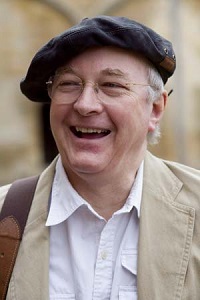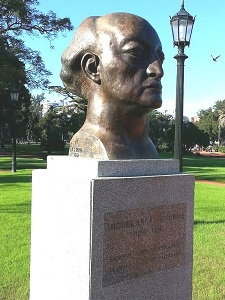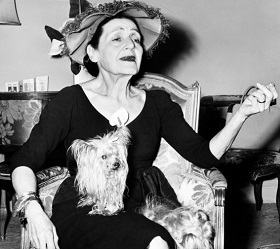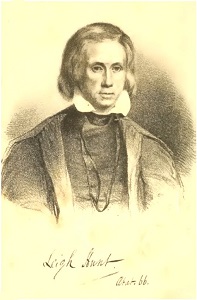De Amerikaanse schrijver David Vann werd geboren op 19 oktober 1966 op Adak Island, Alaska. Zie ook alle tags voor David Vann op dit blog.
Uit: Aquarium
“That’s not enough. You’re going to search until you find something, and you’re going to tell me. Right now. Sheri. Please. You do it now or we’re gone. You give me some way to have some sympathy for you as I stand in this nice house, all lovingly redone, and think about the broken house you left us in, with its leaky roof and no heat and no insulation and nothing. Tell your sob story about the fucking war, whatever it was that my mom thought you were so broken about. My grandfather closed his eyes. No story ever explains. But I’ll give you what you want. I think I know the moment you want, because I made a kind of decision. There was some change. But I can’t start the story at the beginning. I’ve never been able to do that. I have to start at the end and then go back, and it doesn’t finish, because you can go back forever. Do it, my mother said. I don’t think Caitlin should hear. She can hear. Okay. You’re her mother. That’s right. So I won’t give the awful details, but I was lying in a pile of bodies. My friends. The closest friends I’ve ever had. Not piled there on purpose, but just the way it ended up because I had been working on the axle, lying on the ground. And the thing is, the war was over. It had been over for days, and we were laughing and a bit drunk, telling jokes. There was something unbearable about the fact that we’d all be going our separate ways now. The truth is that we didn’t want to leave. We wanted the war over, but we didn’t want what we had together to be over. I think we all had some sense that this was the closest we’d ever be to anyone, and that our families might feel like strangers now. So that’s it? You couldn’t be a father and husband because you weren’t done being a buddy? No. No. It’s the way it happened, in a moment that was supposed to be safe. After every moment of every day in fear for years, we were finally safe, and that’s when the slugs came and I watched my friends torn apart and landing on me, dying. That’s the point. We were supposed to be safe. And with your mother, too, I was supposed to be safe. A wife, a family. The story doesn’t make any sense unless you know every moment before it, every time we thought we were going to die, all the times we weren’t safe. You can’t just be told about that. You have to feel it, how long one night can be, and then all of them put together, hundreds of nights and then more, and there’s a kind of deal that’s made, a deal with god. You do certain terrible things, you endure things, because there’s a bargain made. And then when god says the deal’s off later, after you’ve already paid, and you see your friends ripped through, yanked like puppets on a day that was safe, and you find out your wife is going to die young, and you get to watch her dying, something that again is going to be for years, hundreds of nights more, all deals are off.”

David Vann (Adak Island, 19 oktober 1966)
De Britse schrijver Philip Pullman werd geboren op 19 oktober 1946 in Norwich als zoon van een luchtmachtofficier. Zie ook mijn blog van 19 oktober 2010 en eveneens alle tags voor Philip Pullman op dit blog.
Uit: The Golden Compass
« Pantalaimon settled on her shoulder.
“Happy now? Can we go?” he whispered.
“Don’t be silly! I want to look around!”
It was a large room, with an oval table of polished rosewood on which stood various decanters and glasses, and a silver smoking stand with a rack of pipes. On a sideboard nearby there was a little chafing dish and a basket of poppy heads.
“They do themselves well, don’t they, Pan?” she said under her breath.
She sat in one of the green leather armchairs. It was so deep she found herself nearly lying down, but she sat up again and tucked her legs under her to look at the portraits on the walls. More old Scholars, probably; robed, bearded, and gloomy, they stared out of their frames in solemn disapproval.
“What d’you think they talk about?” Lyra said, or began to say, because before she’d finished the question she heard voices outside the door.
“Behind the chair—quick!” whispered Pantalaimon, and in a flash Lyra was out of the armchair and crouching behind it. It wasn’t the best one for hiding behind: she’d chosen one in the very center of the room, and unless she kept very quiet…
The door opened, and the light changed in the room; one of the incomers was carrying a lamp, which he put down on the sideboard. Lyra could see his legs, in their dark green trousers and shiny black shoes. It was a servant.”

Philip Pullman (Norwich, 19 oktober 1946)
De Guatemalteekse schrijver Miguel Ángel Asturias werd geboren op 19 oktober 1899 in Guatemala-Stad. Zie ook mijn blog van 19 oktober 2010 en ook alle tags voor Miguel Ángel Asturias op dit blog.
Uit: Der Herr President (Vertaald door Jacob Bachmann)
„Manchmal weckten sie die Schreie eines Idioten, der sich in der Plaza de Armas verloren fühlte, aus den schönsten Stellen der Träume, manchmal das Seufzen einer Blinden, die träumte, sie hänge mit Fliegen bedeckt an einem Haken wie das Fleisch im Schlachthaus. Manchmal die Schritte einer Streifwache, die einen politischen Gefangenen wegschleppte, dem Frauen folgten, um mit tränennassen Taschentüchern die Blutspuren wegzuwischen.
Manchmal auch das Schnarchen eines schorf befallenen Alten oder der Atem einer schwangeren Taubstummen, die aus Angst weinte, weil sie in ihrem Bauch ein Kind fühlte. Der Schrei des Idioten jedoch war der traurigste. Er zerriss den Himmel. Es war ein langer, aus den Tiefen der Seele kommender Schrei, der nichts Menschliches mehr an sich hatte.
An Sonntagen kam in jene seltsame Gesellschaſt auch ein Betrunkener, der, im Schlaf weinend, wie ein Kind nach seiner Mutter rief. Wenn der Idiot das Wort Mutter hörte, das im Munde des Betrunkenen zugleich Verwünschung und Klage war, richtete er sich auf, blickte von einem Ende der Pforte zum andern und weckte nun auch die Genossen mit seinem Schreien, weinte aus Furcht und begleitete so das Geheul des Betrunkenen.
Es bellten Hunde, man hörte Stimmen, und die arg Verärgerten standen auf und machten noch mehr Lärm beim Versuch, die Ruhe wiederherzustellen. Ruhe, oder es möge die Polizei kommen! Doch die Polizei wollte mit ihnen nichts zu tun haben. Keiner von ihnen besaß genug, um eine Buße bezahlen zu können.
»Es lebe Frankreich«, rief Patahueca inmitten der Schreie und Sprünge des Idioten, der schließlich zum Spottobjekt der Bettler geworden war wegen jenes hinkenden und verleumderischen Kerls, der während der Woche manchmal den Betrunkenen nachahmte. Patahueca ahmte den Betrunkenen nach, und Pelele, dies war der Spitzname des Idioten, der, wenn er schlief, den Eindruck eines Toten machte, lebte bei jedem Schrei auf, ohne auf die in Lumpen gewickelten Haufen zu achten, die, wenn sie ihn halb von Sinnen sahen, rohe Worte wechselten und schrill lachten. Mit fernen Augen über die scheußlichen Gesichter seiner Genossen hinwegblickend, ohne etwas zu sehen, ohne etwas zu hören, ohne etwas zu fühlen, vom Weinen müde, schlief er schließlich ein. Jeden Abend jedoch weckte ihn bald darauf die Stimme Patahuecas: »Mutter …!«

Miguel Ángel Asturias (19 oktober 1899 – 9 juni 1974)
Borstbeeld in de Paseo de los Poetas, Buenos Aires
De Amerikaanse schrijfster Fannie Hurst werd geboren op 19 oktober 1889 in Hamilton, Ohio. Zie ook alle tags voor Fanny Hurst op dit blog.
Uit: Get Ready The Wreaths
“A considerable flow of daylight thus diverted, The Convenience Merchandise Corner, even of early afternoon, fades out into half-discernible corners; a rear-wall display of overalls and striped denim coats crowded back into indefinitude, the haberdashery counter, with a giant gilt shirt-stud suspended above, hardly more outstanding.
Even the notions and dry-goods, flanking the right wall in stacks and bolts, merge into blur, the outline of a white-sateen and corseted woman’s torso surmounting the top-most of the shelves with bold curvature.
With spring sunshine even hot against the steel rails of Winchester Road, and awnings drawn against its inroads into the window display, Mrs. Shila Coblenz, routing gloom, reached up tiptoe across the haberdashery counter for the suspended chain of a cluster of bulbs, the red of exertion rising up the taut line of throat and lifted chin.
“A little light on the subject, Milt.”
“Let me, Mrs. C.”
Facing her from the outer side of the counter, Mr. Milton Bauer stretched also, his wellpressed, pin-checked coat crawling up.
All things swam out into the glow. The great suspended stud; the background of shelves and boxes; the scissors-like overalls against the wall; a clothes-line of children’s factory-made print frocks; a center-bin of women’s untrimmed hats; a headless dummy beside the door, enveloped in a long-sleeved gingham apron.
Beneath the dome of the wooden stud, Mrs. Shila Coblenz, of not too fulsome but the hour-glass proportions of two decades ago, smiled, her black eyes, ever so quick to dart, receding slightly as the cheeks lifted.
“Two twenty-five, Milt, for those ribbed assorted sizes and reenforced heels. Leave or take. Bergdorff & Sloan will quote me the whole mill at that price.”

Fannie Hurst (19 oktober 1889 – 23 februari 1968)
De Engelse dichter, schrijver en essayist James Leigh Hunt werd geboren op 19 oktober 1784 in Southgate, Middlesex. Zie ook mijn blog van 19 oktober 2010 en ook alle tags voor Leigh Hunt op dit blog.
The Glove and the Lions
King Francis was a hearty king, and loved a royal sport;
And one day, as his lions fought, sat looking on the court:
The nobles filled the benches round, the ladies by their side,
And ‘mongst them sat the Count de Lorge, with one for whom he sighed;
And truly ’twas a gallant thing to see that crowning show –
Valour and love, and a king above, and the royal beasts below.
Ramp’d and roar’d the lions, with horrid laughing jaws;
They bit, they glared, gave blows like beams – a wind went with their paws:
With wallowing might and stifled roar, they rolled on one another,
Till all the pit, with sand and mane, was in a thunderous smother;
The bloody foam above the bars came whizzing through the air;
Said Francis then, “Faith! Gentlemen, we’re better here than there!”
De Lorge’s love o’erheard the King,–a beauteous lively dame,
With smiling lips and sharp bright eyes, which always seem’d the same:
She thought, “The Count my lover is brave as brave can be –
He surely would do wondrous things to show his love of me:
Kings, ladies, lovers, all looked on; the occasion is divine”
I’ll drop my glove, to prove his love: great glory will be mine!”
She dropped her glove to prove his love, then looked at him and smiled;
He bowed, and in a moment leapt among the lions wild.
The leap was quick, return was quick, he has regain’d his place,
Then threw the glove – but not with love – right in the lady’s face!
“in truth,” cried Francis, “rightly done!” and rose from where he sat.
“no love,” quoth he, “but vanity, sets love a task like that!”

Leigh Hunt (19 oktober 1784 – 28 augustus 1859)
Op 66-jarige leeftijd
De Surinaamse schrijver Nardo Aluman (eig. Ronald Renardo Aloema) werd geboren in Christiaankondre op 19 oktober 1946. Zie ook alle tags voor Nardo Aluman op dit blog en eveneens mijn blog van 19 oktober 2010
Uit: Epakano Jakonombo/Tijdens de opstanding
“De Byjai, die ook een bijzonder karakter had, vrolijk, eerlijk, behulpzaam en liefdevol was, sprak nooit met zijn vrouw of met anderen over zijn bijzondere gaven. Het enige wat zijn vrouw van hem wist, was dat hij op onverwachte ogenblikken niet meer in huis aanwezig was en als hij er dan weer was, vertelde hij aan zijn vrouw en kinderen dat hij was gaan wandelen. Soms duurde zo’n verdwijning een paar dagen: Waar hij precies naar toe ging, wist hij alleen.
Zoals elke pyjai in die tijd, leefde hij erg gedisciplineerd en volgde onder andere een streng dieet. Zo at hij vlees of vis, nooit vers maar gerookt. Verder kwam hij nooit in aanraking met vrouwen in de menstruatieperiode. Elke inwoner van Ulemari-undy wist dit. De Byjai had zichzelf in de loop van zijn leven zodanig geestelijk ontwikkeld, dat hij een waardige geestelijke was geworden.
Van heinde en ver kwamen zieken, naar lichaam of geest, naar hem toe voor hulp. Hij genas hen met succes. Toen hij wist dat hij vergevorderd was, begon hij in zijn dorp met een mentale ombuiging van zijn volk. Zijn streven was gericht op de training van elk individu voor een hoger geestelijk welzijn. Eén van zijn doelstellingen was het minimaliseren van de dood en hij verkondigde dat doden op een dag zouden verrijzen.
Hij trof toen voorbereidingen voor deze ‘opstanding’. Hij instrueerde de mensen hoe zij zich moesten klaarmaken voor dit gebeuren. Hij kondigde voor iedereen een periode van vasten aan, die een half jaar zou duren. Tijdens dit vasten mochten de inwoners van Ulemari-undy geen alcoholhoudende dranken gebruiken, alleen af en toe wat jonge casiri. Jong en oud moesten dagelijks een kruidenbad nemen, onder leiding van de Byjai. Alle geneugten van de wereld moest men in deze zes maanden vermijden en de mensen kregen de raad om hun bezittingen in de grond te begraven. Een uiterst sober leven voor de inwoners van Ulemari-undy was aangebroken.
Om deze periode in te wijden, hield men een groot feest. Het grootste deel van de bevolking ging daarna tot vasten over. Een klein deel van de mannen zorgde voor de nodige gemeenschappelijke voedselvoorraad en een speciale groep vrouwen had eerst een mierenproef ondergaan.”

Nardo Aluman (Christiaankondre, 19 oktober 1946)
Christiaankondre
Zie voor nog meer schrijvers van de 19e oktober ook mijn blog van 19 oktober 2013.
